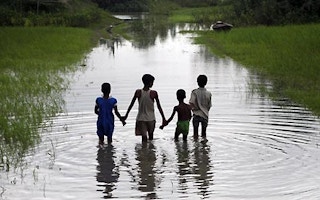At the recently concluded 7th International Conference on Community-Based Adaptation to Climate Change (CBA7) in Bangladesh, government officials from Africa and Asia formed an alliance to support climate change efforts aligned to their development plans.
Named the Government Group Network on Climate Change Mainstreaming and Development, it includes Ethiopia, Kenya, Mozambique, The Gambia, Zanzibar, Cambodia and Bangladesh as its founding members.
These countries are especially vulnerable to climate change and the network aims to assist their respective policymakers through information sharing and collaboration, factoring in climate change issues alongside development goals and strengthened policy implementation.
To do so, the network has devised a framework for assessing and planning of how climate change can be integrated by national and sub-national planning professionals. The success of the framework requires information and awareness, resources for programmes and projects, and political will.
Prime Minister Sheikh Hasina, who opened the CBA7 conference, called out to rich countries to help poorer nations adapt to climate change, and develop with sustainability in place. Nevertheless, she did stress that developing countries, like Bangladesh, were already leading the way in adaptation.
Atiq Rahman, director of the Bangladesh Centre for Advance Studies (BCAS) that co-organised the conference, said, “The issues of climate, development and vulnerability of the poor must be central to the future decision-making process. There must be assured, adequate and sustainable financial resources for the poorest of the world impacted by climate change-induced extreme events.”
The Government Group Network plans to expand its reach to other developing nations as well.
The conference, which was co-organised by the International Institute for Environment and Development (IIED), helped pool government decision makers into the mix of civil society organisations that have been involved in developing communities adapt to climate change from the beginning. With government support, from both local, national and international levels, programmes can be mainstreamed and integrated to macro development plans.

















